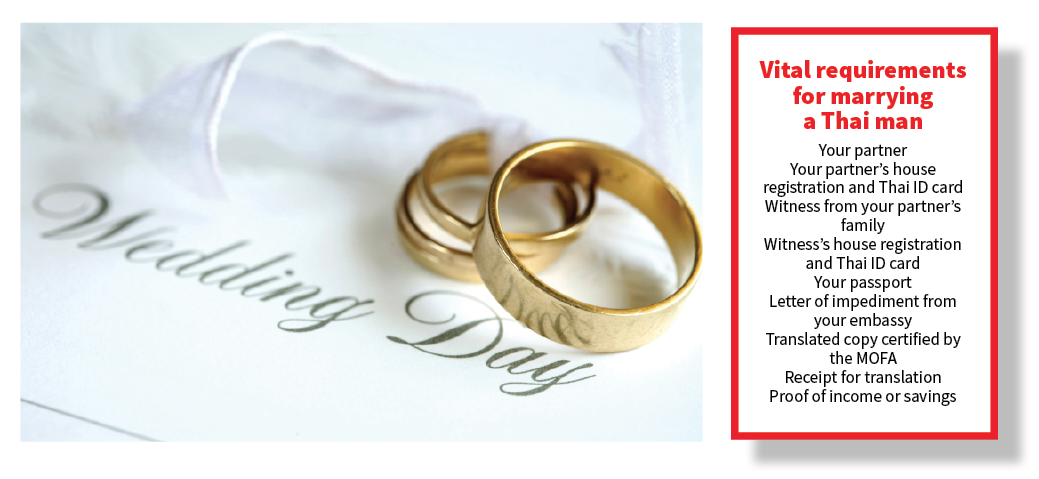The trials and tribulations of Thai marriages
By Abigail Harker
| As a travel and lifestyle journalist, I am constantly sent to vast locations all around the world, often spending more time outside of Thailand than I do inside it. My reason for returning to Bangkok as often as I do: my wonderful Thai partner. But due to my frequent entering and exiting of Thai borders my passport now gets flagged at immigration. Something no foreigner ever wants to hear. As a foreign woman dating a Thai man everyone, including Thai immigration officials, said how easy it would be for us to get married. Women, supposedly, do not need to prove their income or have a large sum of money in the bank. All I needed was a letter from my embassy confirming that I was single and able to marry, have it translated into Thai and then certified by the Ministry of Foreign Affairs (MOFA). |
Posthaste we checked every official government website and online forum we could find dealing with the issue of marriage in Thailand, but we came up empty-handed. There is plenty information regarding the requirements of a foreign man wishing to marry a Thai woman, but close to none regarding the opposite circumstance. With my partner having grown up in England and neither of us familiar with the Thai legal system or the Thai technical jargon involved, we thought it best to hire a lawyer to help us with the proceedings and translations.
Repeatedly, we confirmed with our lawyer that we had all the required documents and I made a separate trip to the Bangrak District Office to triple check that my documents were all in order. “All you need is the certified translated letter, your passport, and your partner’s Thai ID card”, the district officer told me.
What both the district office and our lawyer ‘forgot’ to mention was that we would also need my partner’s house registration documents, a member of my partner’s family to act as a witness along with their house registration documents, as well as the receipt for the MOFA certification. If it had not been for a friend who had recently been through this process, we would never have known and would have arrived at the district office missing several vital requirements.
Finally the day came and we couldn’t be more excited. Dressed in our best, we headed to the district office at 8.30am eager to sign the dotted lines and join together in matrimony.
Upon arrival we submitted our documents to our lawyer and waited patiently to be called. Half an hour later our lawyer came back to us saying our application had been denied. The district office would not accept our application as I did not submit proof of income. As a freelance writer, my income is inconsistent and varies from month to month. My partner often supports me, but to them this was unacceptable. “What if something happens to him or if he loses his job?” they proclaimed to us.
Thai women with little or no income are often supported by their foreign husbands, so why is it a problem for me to be supported by my Thai husband? As we found out, there is a new rule in place as of the beginning of 2016 whereby all foreigners have to prove some sort of income or savings. A law that no one mentioned to us at any point and not even our lawyers were aware of.
After arguing our case to no avail, we headed to the Sathorn District Office. They accepted our application but said I would need a new affidavit issued from my embassy stating that I was a freelance writer with an income of X amount. By this time it was after 12pm and my embassy had already closed. Our patience was starting to wear thin.
In an act of desperation we were able to get a printed bank statement from my international account and hope the Bangrak district office would accept it.
After eight stressful hours of running around Bangkok and waiting for government officials, we were finally married and we couldn’t be happier.
A hard lesson we learnt that day was that websites and online forums are of no help and are missing information on this subject, lawyers are often uninformed of new laws, and staff at district offices leave out important pieces of information. So who can you trust? Only expats and other foreigners who have been through this process themselves. Consult various sources and be as informed as possible.



 RSS Feed
RSS Feed
















